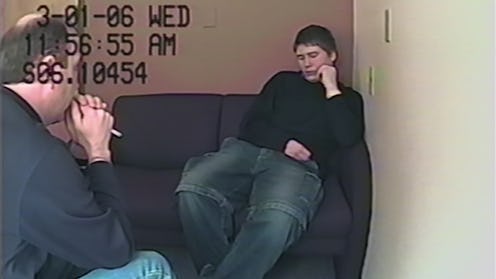Entertainment
'Making A Murderer' Defendant Brendan Dassey Is Not Being Released From Prison—REPORT
On Friday, Dec. 8, a federal appeals court overturned a ruling that would have freed Making a Murderer defendant Brendan Dassey from prison. The judges have decided that Dassey's confession was not coerced, and he will remain in prison. According to the AP report, the judges' decision was extremely close, with a four to three decision that Dassey's confession wasn't coerced. In 2007, Dassey was sentenced to life in prison after telling detectives that he helped his uncle, Steven Avery, rape and kill photographer Teresa Halbach in the Avery family's Manitowoc County salvage yard. At the time of his confession, Dassey was 16.
In June, a federal court upheld the ruling that Dassey's confession was coerced. The hit Netflix true crime series Making a Murderer brought national attention to Dassey and Avery's cases, and highlighted issues with the justice system. The show argued that Dassey's confession was either partially or fully coerced. However, the Manitowoc County sheriff's department in Wisconsin has insisted that they followed standard protocol throughout the interrogation process. They also maintain that their methods didn't lead to a false confession. In January 2016, Manitowoc County Sheriff Robert Hermann told The Wrap, "We're not pleased with the way the film has portrayed us."
Despite a federal judge overturning Dassey's conviction in 2016, and a three-judge panel from 7th U.S. Circuit Court of Appeals agreeing with the decision, the state of Wisconsin asked for the full court to review the ruling. This led to Friday's decision that Dassey should remain in prison.
The 39-page ruling reveals that the three judges who were in dissent made strong arguments in Dassey's favor. CBS News reports that Judge Ilana Diamond Rovner said,
"His confession was not voluntary and his conviction should not stand, and yet an impaired teenager has been sentenced to life in prison. I view this as a profound miscarriage of justice."
In Making a Murderer, the filmmakers argued that Dassey's confession should be overturned due to the fact that he was 16, there was allegedly no adult present at the time of his interrogation, and he suffered from mental deficiencies. Because of the circumstances, the series argued that his confession was involuntary under the Fifth and Fourteenth Amendments of the U.S. Constitution.
At this point, it's unclear if Dassey's lawyers will continue to fight the court's decision. They would need to take his case to the Supreme Court now in order to secure their client's freedom. However, the fact that Netflix's true crime series sparked a debate that ultimately led to the reexamination of both Dassey and Avery's cases remains impressive, no matter your feelings on Dassey's innocence or guilt.
Only time will tell if Dassey's lawyers will continue to contest the court's decision. At this time, Dassey has spent more than a decade of his life in prison. His journey is one that still appears to be very much in progress.
Despite Friday's ruling, Making a Murderer remains a landmark series that sparked a much-needed discussion about interrogation methods in the U.S. justice decision. Three years after the series premiered and the discussion continues. It's clear from the dissenting judges that those at the highest levels of power take their role in deciding the fate of people like Dassey seriously.
It's unclear whether or not Dassey will ever be released from prison now that his life sentence is being upheld. However, it's unlikely that his story is over just yet. Making a Murderer brought Dassey's case to the public's attention in a major way, and it seems unlikely that fans of the series will be moving on from his plight anytime soon.
